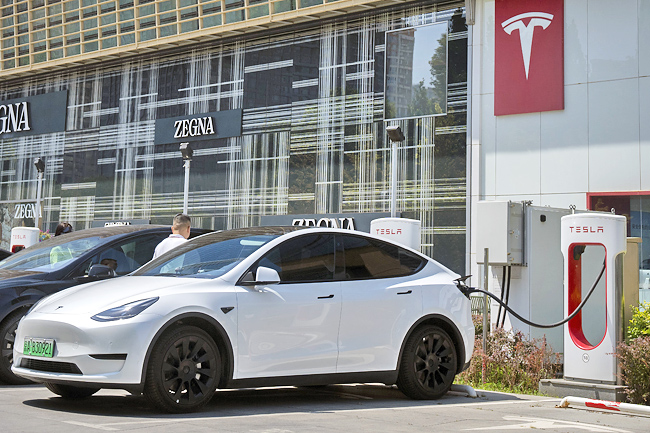BEIJING (AP) – Threatened by possible shortages of lithium for electric car batteries, automakers are racing to lock in supplies of the once-obscure “white gold” in a politically and environmentally fraught competition from China to Nevada to Chile.
General Motors Co (GM) and the parent company of China’s BYD Auto Ltd went straight to the source and bought stakes in lithium miners, a rare step in an industry that relies on outside vendors for copper and other raw materials. Others are investing in lithium refining or ventures to recycle the silvery-white metal from used batteries.
A shortfall in lithium supplies would be an obstacle for government and industry plans to ramp up sales to tens of millions of electric vehicle (EVs) a year. It is fuelling political conflict over resources and complaints about the environmental cost of extracting them.
“We already have that risk” of not being able to get enough, said GM’s chief financial officer, Paul A Jacobson at a Deutsche Bank conference in mid-June.
“We’ve got to have partnerships with people that can get us the lithium in the form that we need,” Jacobson said.
Ford Motor Co has signed contracts stretching up to 11 years into the future with lithium suppliers on two continents. Volkswagen AG and Honda Motor Co are trying to reduce their need for freshly mined ore by forming recycling ventures.

Global lithium output is on track to triple this decade, but sales of electric SUVs, sports cars and sedans that rose 55 per cent last year threaten to outrun that. Each battery requires about eight kilogrammes of lithium, plus cobalt, nickel and other metals.
“There will be a shortage of EV battery supplies,” said senior auto analyst for BMI Joshua Cobb.
Beijing, Washington and other governments see metal supplies for EVs as a strategic issue and are tightening controls on access. Canada ordered three Chinese companies last year to sell lithium mining assets on security grounds.
Other governments including Indonesia, Chile and Zimbabwe are trying to maximise their return on deposits of lithium, cobalt and nickel by requiring miners to invest in refining and processing before they can export.
GM is buying direct access to lithium by investing USD650 million in the Canadian developer of a Nevada mine that is the biggest US source. In return, GM said it will get enough for one million vehicles a year.
Conservationists and American Indians are asking a federal court to block development of the Nevada mine, which the Biden administration has embraced as part of its clean energy agenda. Opponents said it might poison water supplies and soil and pollute nesting grounds for birds.
“Securing metals must not come at a sacrifice to the environment,” said a US group, the Natural Resources Defense Council, in a report last year.
BYD Auto’s parent company, battery maker BYD Co, has announced more than USD5 billion in investments in lithium mining and refining over the past 18 months.
Most are in China, but BYD also is promising to spend USD290 million on a processing facility in Chile, one of the biggest lithium producers. In exchange, BYD is allowed to buy lithium from Chilean miners at a discount.
At home, BYD announced last year it would invest CNY28.5 billion (USD4.2 billion) in a venture to produce 100,000 tonnes of lithium carbonate a year in the eastern city of Yichun.
Another Chinese automaker, NIO Inc, bought 12 per cent of Australian lithium miner Greenwing Resources Ltd last year for AUD12 million (USD8.1 million).
Despite rising output, the industry may face shortages of lithium and cobalt as early as 2025 if enough isn’t invested in production, according to Leonardo Paoli and Timur Gul of the International Energy Agency.
“Supply side bottlenecks are becoming a real challenge,” said Paoli and Gul in a report last year.
Automakers might be putting in their own money to reassure “notoriously risk-averse” miners, according to Alastair Bedwell of GlobalData. He said miners are reluctant to “go all out” on lithium until they are sure the industry won’t switch to batteries made with other metals.
Even if they do, developing lithium sources is a yearslong process.
Mines that came online in 2010-19 took on average more than 16 years from discovery to the start of production, according to Paoli and Gul of the IEA.
“These long lead times raise questions about the ability of supply to ramp up,” they wrote.
Investment by automakers might “help to remove some of their partners’ risk and ultimately create more production”, Bedwell said in an e-mail.
Worldwide lithium resources are estimated at 80 million tonnes by the US Geological Survey.
Bolivia’s are the biggest at 21 million tonnes, followed by Australia with 17 million and Chile with nine million. China has 4.5 million tonnes of known reserves and the US has one million.
Forecasts of annual global production range as high as 1.5 million tonnes by 2030. But demand, if EV sales keep rising at double-digit annual rates, is forecast to increase to up to three million tonnes.
Sales of battery-powered and gasoline-electric hybrid vehicles took off in 2021, more than doubling over the previous year to 6.8 million, according to EV Volumes, a research firm.






